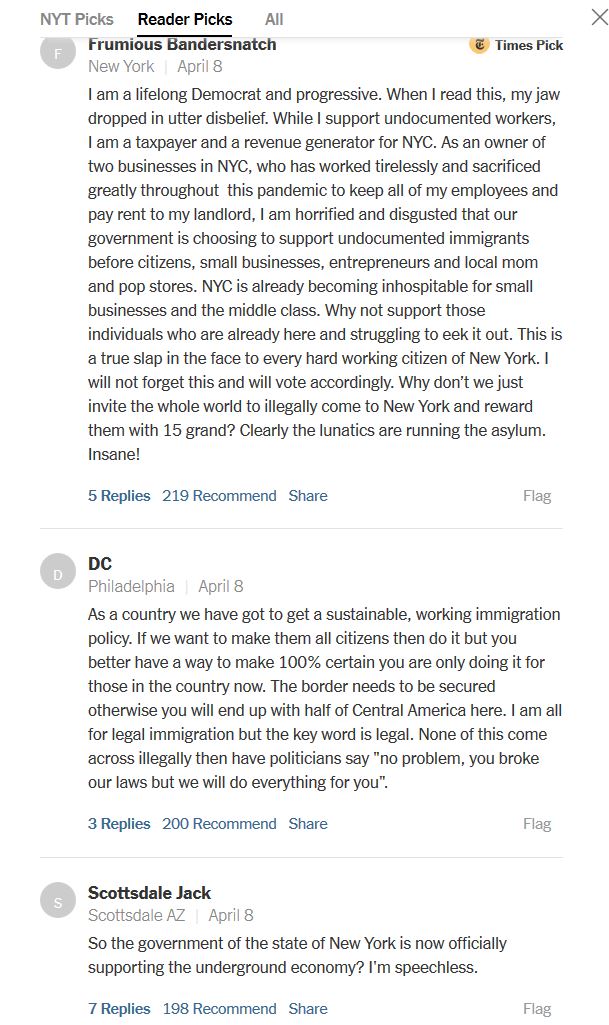It’s time for struggling New Yorkers to help people who are struggling also: illegal immigrants.
They need $15,000 each in cash.
When the coronavirus arrived in New York City a year ago, it hit enclaves of undocumented immigrants with a fury, killing thousands and wiping out the service and construction jobs that kept many families afloat.
Lifelines like unemployment insurance and federal stimulus checks were out of reach because undocumented people are ineligible for most government aid. Instead, they have relied on food pantries, lenient landlords and loans from friends.
But after a sweeping move by lawmakers this week, New York will now offer one-time payments of up to $15,600 to undocumented immigrants who lost work during the pandemic. The effort — a $2.1 billion fund in the state budget — is by far the biggest of its kind in the country and a sign of the state’s shift toward policies championed by progressive Democrats.
“I’ve met neighbors who have not been able to pay rent, or put food on the table, or been able to provide their children with a laptop when a public school has not been able to provide one,” said State Senator Jessica Ramos, a Democrat from Queens and lead proponent of the fund.
The excluded workers fund, part of the state’s new $212 billion budget deal that was reached on Tuesday, was one of the most contentious points of debate during negotiations, which dragged on past the April 1 deadline.
Republicans instantly criticized the measure as out of touch at a time when many other New Yorkers were still struggling, while some Democrats from swing districts upstate and on Long Island said privately that a publicly funded rescue program for people who are not in the country legally could be wielded as a cudgel against them in future elections.
“The question is not, do you help these workers, it is how do you do it and how do you structure it in a way where it is defensible in these districts,” said Bruce Gyory, a Democratic political consultant. Workers had made a compelling case that they had been devastated by the pandemic, he said, but some rural and suburban voters might see the payments as an expensive, and unfair, benefit for noncitizens.
Most Democrats would not speak publicly about fault lines in their party, but internal clashes emerged on social media on Tuesday as lawmakers squabbled about eligibility and traded personal insults.

Even the kind of people who take the New York Times seriously are against it
New York’s fund dwarfs a similar relief program enacted in California, where officials set up a $75 million cash assistance program last year that gave undocumented immigrants a $500 one-time payment on a first-come, first-served basis.
It is hard to quantify the number of undocumented families living in New York, but the left-leaning Fiscal Policy Institute said Wednesday that the fund could benefit as many as 290,000 people statewide.
Undocumented workers could receive up to $15,600, the equivalent of $300 per week for the last year, if they can verify that they were state residents, ineligible for federal unemployment benefits and lost income as a result of the pandemic.
Others who can prove at least their residency and identity, and provide some work documentation, could be eligible for a lower sum up to $3,200.
The proposal found support in the Democratic-controlled State Senate and Assembly, especially among progressives who had argued for relief for more than a year. In the months leading up to the budget deadline, undocumented immigrants sought to draw attention to their cause.
Protesters gathered outside Gov. Andrew M. Cuomo’s office and shut down bridges, carrying hard hats, pots and pans, and brooms and mops — the instruments of the jobs they had held — along with banners saying, “Our Labor Saved Lives.” And as the measure neared approval, about a dozen supporters who camped around a Manhattan church staged a three-week hunger strike that ended Wednesday.
Over the weekend, as an agreement around the fund materialized, it drew forceful denunciations from state Republicans, who described it as the latest “outlandish development” of one-party rule in Albany. The state also passed tax increases on the wealthy, meaning New York City millionaires would soon pay the highest personal income taxes in the nation.
…
After the deal was struck, undocumented workers described in interviews months of desperation as work had dried up during the pandemic.
“There were days I couldn’t sleep. To be honest with you, we had nothing,” said Giovanna Carreño, a house cleaner who had supported her two children in Yonkers for more than a decade before the coronavirus arrived and her six clients told her to stay home. Ms. Carreño, 50, who immigrated from Peru, resumed working a few days a week this year, only to fall sick with Covid herself.
She said she paid taxes and asked that the government recognize the contributions she and other workers made to the economy.
I’m sure this will really help the economy.
